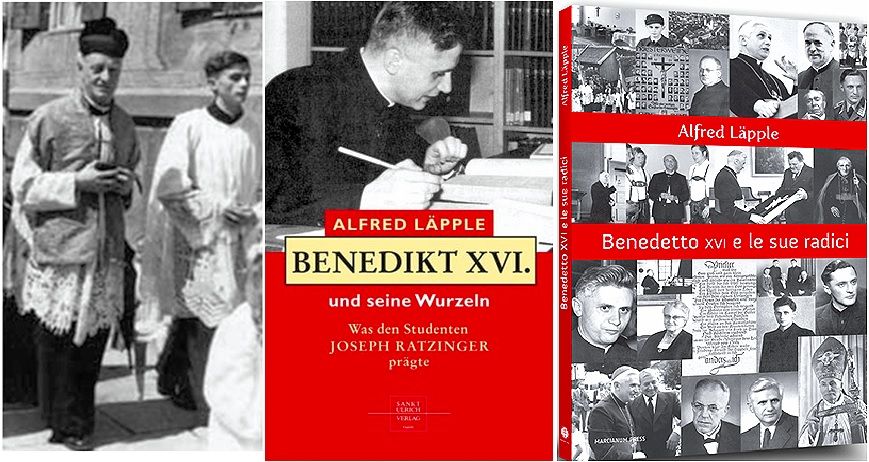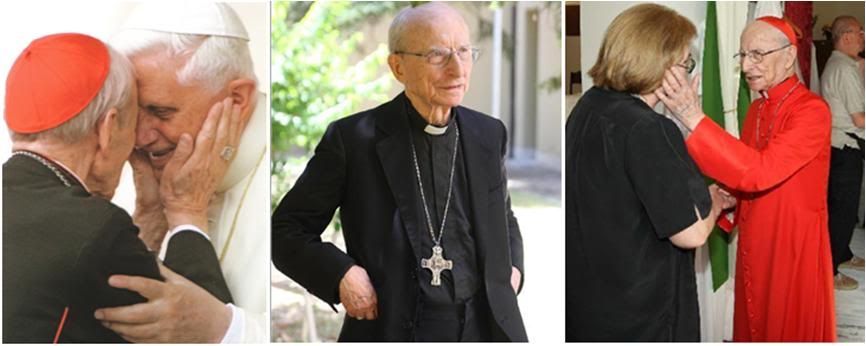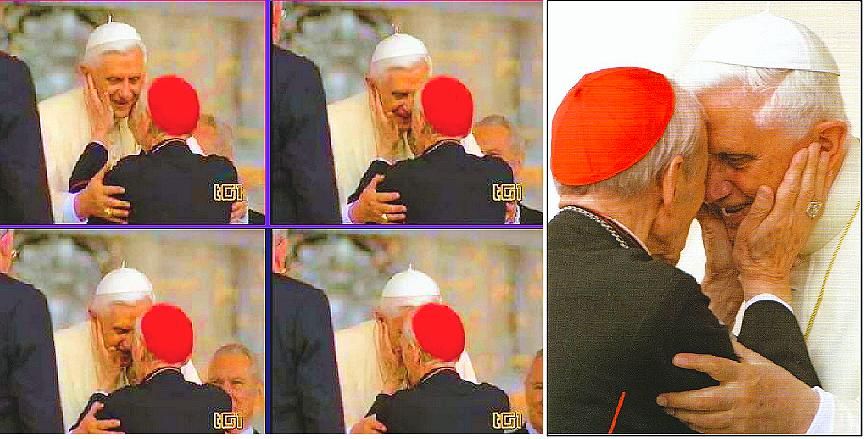 COMMEMORATIVE POSTSCRIPTS
Two men, each in his own way special in the affections of emeritus Pope Benedict XVI, recently passed away. And while I do not now have time to put together a proper tribute to them from posts in the past about them, let me at least acknowledge them with heartfelt prayers and ask that you do, too.
COMMEMORATIVE POSTSCRIPTS
Two men, each in his own way special in the affections of emeritus Pope Benedict XVI, recently passed away. And while I do not now have time to put together a proper tribute to them from posts in the past about them, let me at least acknowledge them with heartfelt prayers and ask that you do, too.
First, Mons. Alfred Laepple, who died at his home in Gilching, suburb of Munich, on July 21 at age 95. Laepple was the Prefect of Studies at the Freising seminary when Joseph Ratzinger began studying for the priesthood after the war. They soon became friends, sharing a passion for reading, and in particular, John Henry Newman's writings. Laepple got Joseph at age 17 to translate a work by Thomas Aquinas
De caritatis from Latin to German. When Laepple celebrated his first Mass (he was ordained in 1947), the young Joseph was his acolyte. Their friendship lasted through the years, mostly by correspondence, even after Ratzinger became Pope. In 2011, Laepple attended the celebration in Freising to commemorate the 60th anniversary of Joseph and Georg Ratzinger's ordination as priests.
In 2009, Mons. Laepple wrote a book about Joseph Ratzinger that was subsequently published in Italian.
 Left photo shows seminarian Ratzinger serving as acolyte to Fr. Laepple at this first Mass.
Left photo shows seminarian Ratzinger serving as acolyte to Fr. Laepple at this first Mass.
Laepple was a professor of philosophy and author of many books on religion. Readers of the PAPA RATZINGER FORUM will remember him for the fascinating and very informative interview he gave 30 GIORNI back in 2006 in which he recalls the early postwar years when he first met the Ratzinger brothers at the seminary in Freising where he was the prefect of studies. See translated article in Page 1 of ENCOUNTERS WITH THE FUTURE POPE
freeforumzone.leonardo.it/discussione.aspx?idd=354530&p=1
Here is a translation of his Preface to his book on Benedict XVI.
Benedetto XVI e le sue radici.
Ciò che ha segnato
la sua vita e la sua fede
[Benedict XVI and his roots:
What shaped his life and his faith]
Alfred Laepple. Marcianum Press, 2008.
177 pp
Why I wrote this book
by Mons. Alfred Laepple
"Strength is not in the branches but in the roots. Only he who is profoundly rooted will overcome tempests and rests storms... The tree stays upright and us supported by its roots. It is said that a tree has as many roots beneath as the branches it has above. The diameter of the crown corresponds to that of the roots."
- Hermann Hesse(1877-1962)
This book would never have been written if something happened that was very personal for me but relevant to the history of the world and the Church.
"There are often events," wrote the Bishop of Innsbruck Reinhold Stecher, "which have for the persons involved a significance that is emblematic, charged with symbolic value."
What was my event? On the late afternoon of April 19, 2005 (it was a Tuesday), I was in front of my TV as millions all over the world were. I was in my village in upper Bavaria, in Gllching [A SUBURB OF mUNICH].
That Cardinal Joseph Ratzinger had been a papabile for years was known to many observers of the Vatican scene around the world, but he turned 78 on April 16, 2005. The oldest elected Pope in modern history was Angelo Roncalli who was 77 when he became Pope in 1958, and so he was initially thought to be nothing more than a 'transitional Pope'.
When, on that April 19 of 2005, from the central loggia of St. Peter's Basilica, the announcement came, 'Habemus papam', one then heard, above the understandable commotion, the name 'Josephum'. And it flashed through my mind that it could only be Ratzinger. I would not have wanted to be in his place!
Shortly after, when the new Pope Benedict XVI appeared at the Loggia, he came out with arms raised and he looked radiant and happy. I have been linked to this man for more than half a century.
On March 19, 1997, in a letter on his name day, I wrote the Cardinal: "I thank God for having met you! I thank you for having given me a friendship that has lasted more than 60 years. And I thank God for having called you to the position, difficult and full of responsibility, as Prefect of the Congregation for the Doctrine of the Faith."
In his goodness, truthfulness and humanity, Pope Benedict XVI, with his theology of the heart, is a rock who gives support and orientation for many. Because, as Goethe said, the man who in times of fluctuation is also disposed to fluctuate simply multiplies evil and spreads it, but he who firmly perseveres in his ideas can shape the world.
Following multiple solicitations, verbal and written appeals - and even because of false statements and inexcusably erroneous interpretations - and urged on by friends, ecclesiastics and publishers, the consideration of a book grew in me, the consideration solidified into a sense of responsibility, and the responsibility into duty, to write this book.
This work is not a biography nor a sketch of one. While writing it, I was always conscious of the sensitive question of citing from letters containing many personal matters without first asking permission from the addressee.
On the other hand, should not some events and experiences known only to me be better cited at this time for the use of future biographers? Thus, I have in this book indicated these events and experiences, dating to 1946 when we first met, for the record.
Here I have tried to describe and document the roots from which developed his life and his thought, his faith and his prayer - a sketch, if you will, of his biography and theology imprinted in those early years. This text was written and is intended to be read as an obligation of the heart, or better still, as the grateful impulse of the heart.
While writing it, my guiding axiom was the heraldic motto chosen by John Henry Newman when he was made a cardinal in 1879: “Cor ad cor loquitur” (The heart speaks to the heart).
Written in Gilching,
where in 1943 Joseph Ratzinger served
as a Flak* auxiliary.
*FLAK, from the German term Flugzeug-abwehr-kanone, anti-aircraft cannon
The book contains previously unpublished excerpts written by Joseph Ratzinger, such as his letters to the auhtor, his pastoral letter of October 1978, an important speech he gave in December 1978 at Unterwössen, and ample citations from German newspaper articles that have not previously been published in Italy.

The second great loss is Cardinal Ersilio Tonini, who died of old age at 99 in the retirement home in Ravenna where he spent his final years. He was the oldest living cardinal and emeritus Archbishop of Ravenna. He had great affection and esteem for Benedict XVI, immortalized in photos and video taken during an encounter they had after a General Audience in St. Peter's Square in 2005.
 Left photo: Shortly after the 2005 Conclave, Cardinal Tonini was photographed giving Benedict XVI a very affectionate greeting. Center and right, the cardinal at the Ravenna residence where he lives, taken on the eve of his 96th birthday.
Left photo: Shortly after the 2005 Conclave, Cardinal Tonini was photographed giving Benedict XVI a very affectionate greeting. Center and right, the cardinal at the Ravenna residence where he lives, taken on the eve of his 96th birthday.
In an interview he gave on his 96th birthday in 2010, Cardinal Tonini was asked about Benedict ZVI:
He is one of the most learned men in the world, one of the best prepared, even if he almost dissimulates his immense competencies. It is a great virtue. I first met him in Rome when I gave the Lenten exercises for bishops and cardinals, and he was a bishop. I am very proud of his commitment. He is a great man, like John Paul II was. He is attentive, reserved, with a very quick and acute intelligence - he is a saint, who has always given his neighbor primacy.
And here is an interview that Cardinal Tonini gave on the occasion of Benedict XVI's double gala in Aprill 2012- his 85th birthday and the seventh anniversary of his election to the Papacy.
 Seven years of Papa Ratzinger:
Seven years of Papa Ratzinger:
'The simple faith of a very fine theologian'
by Marina Corradi
Translated from the 4/19/12 issue of

He knew him long before he became Pope. But in the 1980s, Joseph Ratzinger was, to Cardinal Ersilio Tonini, 98 this year and the world's oldest living cardinal, not just the Prefect of the Vatican's premier dicastery, but also "the German cardinal with a kind face who was never absent at any important meeting or seminar at the Vatican".
"He was always attentive and kind, but a man of few words - someone who preferred to listen instead of putting in his word," he adds.

 At one of the first General Audineces held by Benedict XVI in 2005, Cardinal Tonini famously showed his affection for the Pope. It reminded me of a Chinese patriarch giving his blessing to a younger though more eminent man....
At one of the first General Audineces held by Benedict XVI in 2005, Cardinal Tonini famously showed his affection for the Pope. It reminded me of a Chinese patriarch giving his blessing to a younger though more eminent man....
For the emeritus Archbishop of Ravenna-Cervia, who marks his 98th birthday on July 20, the Pope is almost like a younger brother. Listening to him speak about Benedict XVI, one senses not just a great sympathy but almost an affinity between them - Tonini, born to peasant parents in Piacentina, and Joseph Ratzinger, born to lower middle-class parents in rural Bavaria.
"I liked his gentleness and his south German amiability," he continues. "And his spontaneous way of drawing people to him. The year I was asked to preach the Lenten spiritual exercises to the Roman Curia, I would use German expressions once in a while, since I know the language. He would smile at me from his seat, as if to encourage me or perhaps just happy to hear his native tongue spoken in an unlikely setting.".
Or perhaps the two already shared another common language - the popular piety that both had inherited from their parents , a faith that is profound and is tenacious even through crisis and testing.
In 2005, Tonini did not take part in the Conclave because he was 11 years over voting age.
[In fact, John Paul II only made him a cardinal in 1994, after his 80th birthday]. But he attended the general congregations of the cardinals who met daily in the two weeks preceding the Conclave, with Cardinal Ratzinger presiding as Dean of Cardinals.
"He synthesized for us the overall situation of the universal Church and the challenges that the new Pope would have to confront. As I listened to him, I considered how competent and measured and lucid his interventions were. And i said to myself, 'The new Pope could very well be him'."
As he is. Seven years have passed. Yesterday (April 18), Tonini celebrated his 75th year as a priest. He was ordained in 1937 when the future Pope was just 10 years old. (One feels light-headed to hear the words of someone who is among the very few in the Church hierarchy older than the Pope, who at 85 almost seems young.]
In the relative quiet of the Istituto Santa Teresa [the retirement home in Ravenna where Tonini lives], the cardinal goes on: "He is a gentle person, the Pope, but courageous. Not one to speak in thunderous tones, but when he has to say something, he says it clearly. As he demonstrated in the way he confronted the pedophile-priest scandal. With clear unequivocal words, but never accusatory, rather, with a tone of sorrow."
"In the 1980s, I read one of his first books,
Introduction to Christianity, and was struck by his limpid logic and writing, devoid of any rhetorical artifice. It is the same style I find in JESUS OF NAZARETH - a simplicity that goes with great theological depth".
One says to him: "Eminence, those two volumes on Jesus seem to find their ideal
incipit [opening statement] in one of the first lines in Benedict XVI's first encyclical,
Deus caritas est: 'Being Christian is not the result of an ethical choice or a lofty idea, but the encounter with an event, a person, which gives life a new horizon and a decisive direction'. One hears the urgency to bear witness to men all over about the concrete historicity of Jesus and what is narrated in the Gospels".
"Yes, it is the foundation of Christianity itself, for all time, but every generation needs to see it being testified to all over. The more so with our generation, with its experience of positivism, rationalism/ That is why, in 2005, the Church needed not just a pious man [to be Pope] but someone who also had the pulse, the precise perception of the historical situation, of the challenges of the third millennium, so that Christianity can be embodied, as it must, always and ever anew, in human history".
That professor and theologian of few words, that cardinal who was "much listened to and favored by John Paul II", has reminded men once again of ancient truths, Tonini observed.
"First of all, a Pope from Germany is better able to judge the level of secularization which has been growing in Europe, of the need to repropose the faith in words that are comprehensible today - and that has been the great objective in everything he does.
"That passionate conjugation of faith and reason that he taught us in Regensburg; the splendid discourse to the secular intelligentsia of France in the College des Bernardins, when he compared our time to that in Greece when St. Paul spoke at the Areopagus - that even if the streets today are no longer filled with images of multiple gods, it is even worse that for many, God is unknown. Or, as the Pope said then, 'The actual absence of God is tacitly beset by the questions raised about him'."
"Thus,
quaerere Deum - seek God - as the Pope reiterated in Paris, invoking an existential urgency in that medieval convent which goes back to the roots of Western Christianity. To seek God with faith and reason, while warning, us in a common thread that goes on to
Caritas in veritate, that reason without faith is destined to lose itself in the illusion of its own omnipotence"
And this seems to be a theme dear to Tonini, who is a passionate follower of developments in bioethics and assisted reproduction, in which he sees a hubris, a defiance of man's own nature, namely, the fact that he is God's creature.
He points out that there is here "an echo of our similar provenance, which is popularly rooted but profoundly Christian, which is why Cardinal Ratzinger, though he is not Italian, always seemed very familiar to me".
It's a Christian matrix inherited from centuries of tradition, which, for Tonini, also explains a fundamental trait of this Pope: "He is a man who fears nothing - he trusts God and the Church, he has firm confidence in Providence."
He sees the basic origins of the Pope's faith illustrated also in his choice of the Curate of Ars as the inspiration and model for the Year for Priests: "Consider that parish priest, that humble country priest - what an enlightened and profound conscience he had! So, you see how Ratzinger's roots keep flowering forth during his Pontificate."
But he also notes that this Pope who has centuries of tradition and popular faith behind him, also wrote
Spe salvi in which he asks himself and us, almost provocatively, "whether Christian hope truly works in us today, if that hope is concrete enough to begin to transform the present".
"The urgency that this man feels to announce today that everything is true: the birth, the death, the resurrection of Jesus. The urgency of impressing those truths on us... You see, the Spirit truly breathed on the Conclave. We needed a Christian like him - a theologian but a simple one, a professor but a son of the people. One of those, I am convinced, who is particularly dear to God, because they trust in him and are fearless because of this".
About himself, this is what Cardinal Tonini told 30 GIORNI when he turned 90 in 2004:
Today I am born again, I celebrate my birth. But to tell the truth, every morning I am always born again. And the wish that I make for myself is to hold on to this serenity until the end, because I’m happy to be in the world…
I’ve had the good luck because my mother taught me to wake up full of astonishment. I’m very happy to be in the world, it’s a great miracle. I wish that the people I meet had the same joy I do.
BTW, between Cardinal Tonini, soon to be 98, and Mons. Loris Capovilla (John XXIII's private secretary) who is 96, a shoutout to all nonagenarians who remain as sharp-minded as they are, and the perennial wish that Benedict XVI too will be blessed with 'multos annos' more!

[Modificato da TERESA BENEDETTA 06/08/2013 11:47]